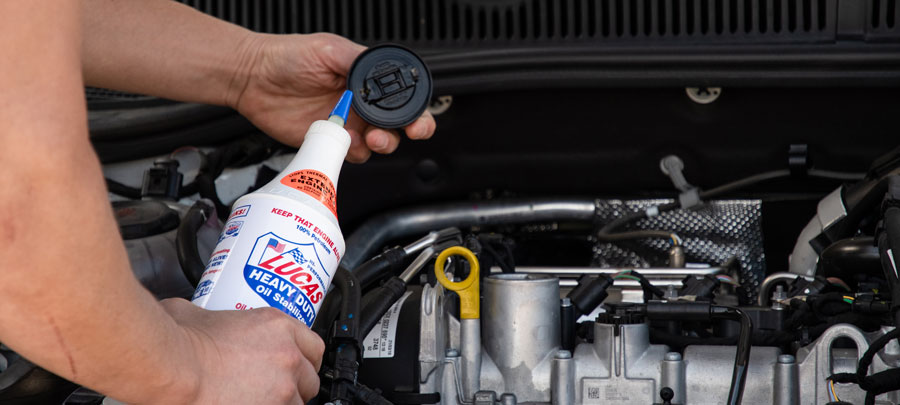If you’re a vehicle owner committed to extending the life of your engine, you may have come across the popular question: Is Lucas Oil Stabilizer safe for my engine? Lucas Oil Stabilizer is a popular additive designed to enhance engine performance, improve fuel efficiency, and reduce wear and tear on engine components. But is it the right choice for your engine? Let’s dive deep into what Lucas Oil Stabilizer is, how it works, and whether it’s safe for your engine.
Table of Contents
What Is Lucas Oil Stabilizer?
Lucas Oil Stabilizer is a high-performance oil additive created to improve the lubrication properties of standard engine oil. It’s formulated by Lucas Oil, a brand known for producing a range of engine and fuel additives. The product is particularly popular among car enthusiasts and mechanics, as it aims to protect engines by reducing dry starts, neutralizing acids, and helping to prevent rust and corrosion in both new and older engines. But while it boasts impressive benefits, you may still be wondering: Is Lucas Oil Stabilizer safe for my engine?
How Does Lucas Oil Stabilizer Work?
To understand if Lucas Oil Stabilizer is safe for your engine, it’s essential to look at how it actually works. Lucas Oil Stabilizer thickens the oil by increasing its viscosity, creating a more durable lubricating film between engine parts. This additional layer of protection is especially beneficial under high-stress driving conditions or in older engines, where wear and tear may be more prominent.
The additive can help reduce engine noise, improve oil pressure, and even decrease oil consumption in older, high-mileage engines. By strengthening the oil’s viscosity, Lucas Oil Stabilizer helps maintain engine protection even under heavy loads and extreme temperatures.
Is Lucas Oil Stabilizer Safe for All Engines?
A primary concern for many vehicle owners is whether using Lucas Oil Stabilizer will negatively impact their engine. So, is Lucas Oil Stabilizer safe for my engine? In most cases, yes, it’s safe. However, there are some considerations to keep in mind, depending on your engine type, age, and oil requirements.
- For Older Engines: If you have an older engine or a vehicle with high mileage, Lucas Oil Stabilizer can provide added protection by reducing wear and friction. In these cases, using Lucas Oil Stabilizer is safe and may even extend the engine’s life.
- For Newer Engines: Newer engines with tight tolerances may not need the additional thickening that Lucas Oil Stabilizer provides. Modern engines are often designed to work best with specific, manufacturer-recommended oil viscosities. Adding an oil stabilizer may interfere with these specifications, potentially affecting fuel efficiency. It’s best to consult your vehicle’s manufacturer guidelines before adding any oil additive to a newer engine.
- Diesel and Gas Engines: Lucas Oil Stabilizer is versatile and compatible with both diesel and gasoline engines, making it a safe option for a wide variety of vehicles. However, it’s always a good idea to check compatibility with your engine type.

Benefits of Using Lucas Oil Stabilizer
If you’re still on the fence, here are some benefits that might help answer the question: Is Lucas Oil Stabilizer safe for my engine?
- Improved Lubrication: Lucas Oil Stabilizer enhances the lubrication of your engine, reducing friction and wear on engine components.
- Reduced Oil Consumption: It can help decrease oil consumption in older engines that tend to burn oil more quickly.
- Enhanced Protection in Extreme Conditions: Whether you’re towing heavy loads, driving in high temperatures, or navigating challenging terrains, Lucas Oil Stabilizer provides additional protection.
- Reduced Engine Noise: Many users report quieter engine operation after using Lucas Oil Stabilizer, as it reduces the friction and wear that cause noise.
Potential Downsides: Is Lucas Oil Stabilizer Safe for Every Situation?
While Lucas Oil Stabilizer offers a range of benefits, it may not be ideal for every engine. Here are some scenarios where Lucas Oil Stabilizer might not be safe or necessary for your engine:
- In Newer Engines with Specific Oil Requirements: As mentioned, some newer engines require oils with precise viscosities, and adding Lucas Oil Stabilizer may alter these properties, potentially reducing efficiency.
- During Cold Starts in Winter: Since the stabilizer increases oil viscosity, it could make it harder for the oil to flow during cold starts in extreme winter conditions. This might lead to engine strain in freezing temperatures.
- Using It in Every Oil Change: While Lucas Oil Stabilizer is safe for periodic use, using it with every oil change may not be necessary. If your engine is running smoothly without issues, adding it too frequently may not yield extra benefits.
Is Lucas Oil Stabilizer Safe for My Engine Long-Term?
Ultimately, is Lucas Oil Stabilizer safe for my engine long-term? In most cases, yes—particularly if you’re using it according to the recommended guidelines. Lucas Oil Stabilizer can be a valuable tool for maintaining engine health, especially if your vehicle experiences high mileage or heavy-duty use. However, like any additive, it’s best used in moderation and tailored to your engine’s needs. Always follow the manufacturer’s recommendations and consult your mechanic if you have any doubts.
Final Thoughts: Should You Use Lucas Oil Stabilizer?
If you’re still wondering, is Lucas Oil Stabilizer safe for my engine, the answer largely depends on your specific vehicle and how you use it. For many drivers, Lucas Oil Stabilizer can be a helpful addition that provides extra protection and peace of mind. Just be sure to consider your engine’s specific requirements, especially if it’s a newer model.
In conclusion, Lucas Oil Stabilizer is safe for most engines, but as with any additive, understanding your engine’s needs is key. Whether you drive a well-used vehicle with high mileage or need added protection for demanding conditions, Lucas Oil Stabilizer offers benefits that may be worth exploring.
“If you’re wondering about potential risks, check out our post on Can Lucas Oil Damage Your Engine? to get a full picture of both benefits and drawbacks.”





Leave a Reply